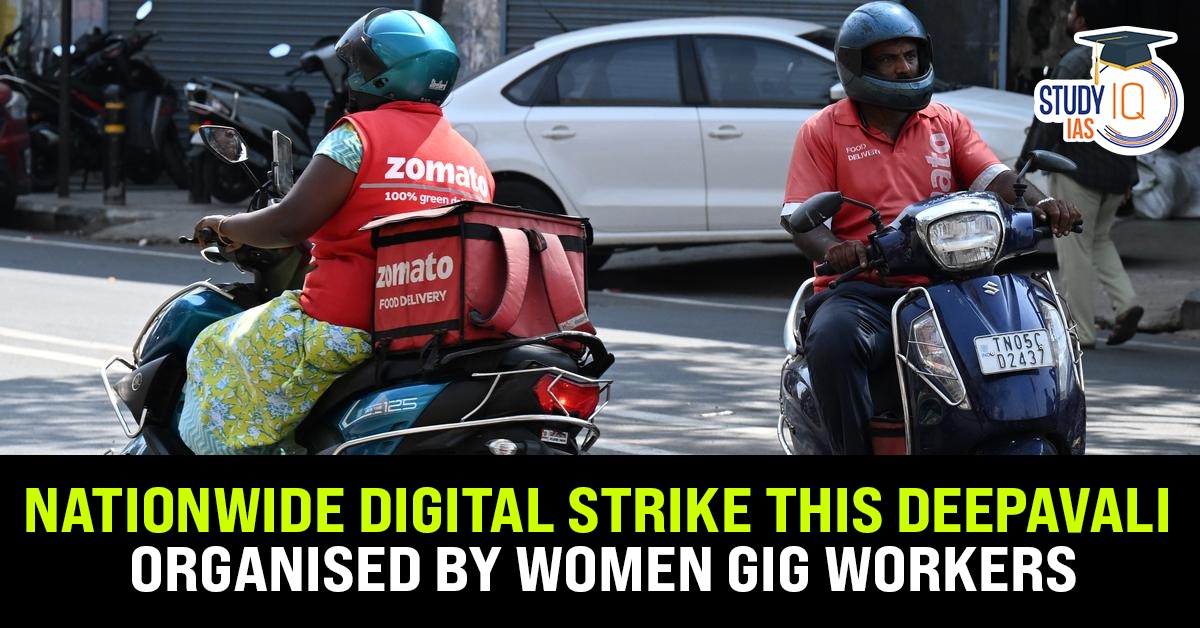Table of Contents
Context
On Diwali, women gig workers across India, led by the Gig and Platform Services Workers Union (GIPSWU), organised a digital strike labelled as “Black Diwali.”
More in News
- The strike called attention to exploitative labour practices in the gig economy, particularly targeting the conditions faced by women gig workers.
- GIPSWU is India’s first union primarily dedicated to women gig workers, aiming to unify gig workers and customers against the unfair practices of platform companies.
|
Facts |
|
- Demands of the Strikers
- The union’s demands include:
- Recognition of gig workers as employees of platform companies.
- Implementation of statutory minimum wages.
- Establishment of grievance redressal mechanisms for workers.
- Inclusion in social security schemes, such as provident funds, pension schemes, and maternity benefits.
- Exploitation in the Gig Economy
- Gig workers highlighted that discounts offered by platform companies during festive seasons often come at the expense of their wages, resulting from exploitative working conditions.
- Many gig workers reported earning as little as ₹100-150 per day, struggling with expenses like transportation and service products.
- The digital gig economy mirrors traditional patriarchy by exploiting women’s labour under the guise of empowerment.
- Digital platforms assign jobs like beauticians, cooks, and housekeepers, roles traditionally designated to women, reinforcing age-old gender roles.
- Job security for women hinges on acceptance of “auto-assigned” jobs and ratings.
- Refusal to accept these often exploitative terms leads to the risk of being “illegally terminated.”
- Women gig workers often face additional challenges, including harassment and violence while working in private residences.
- The making campaigns like “Beti Bachao Beti Padhao” feel contradictory when so many women gig workers struggle under exploitative conditions.
- Despite promises of flexible hours, women gig workers face pressure to meet unrealistic targets.
- The gig platforms’ “freedom” narrative masks a system that imposes heavy financial burdens such as transportation costs, platform fees, and the need to buy service supplies.
- Many women lack basic social security, such as health benefits and minimum wage protections, leading to economic insecurity despite working long hours.
- Key Takeaways and Call to Action
- Worker Rights as a Form of Nation-Building: The gig workers contribute significantly to India’s economy, and their exploitation undermines national progress.
- Advocating for Legislative Change: GIPSWU urges a shift from symbolic social security measures toward substantial legal protections for gig workers.
- Message of Unity: The article concludes by affirming the importance of organized, grassroots movements, and calls for continued solidarity among gig workers worldwide to bring lasting change in labour laws and practices.


 US–Israel Attack on Iran 2026: Khamene...
US–Israel Attack on Iran 2026: Khamene...
 Agentic AI vs AI Agents: Meaning, Differ...
Agentic AI vs AI Agents: Meaning, Differ...
 Prahaar Missile System: Range, Features ...
Prahaar Missile System: Range, Features ...




















